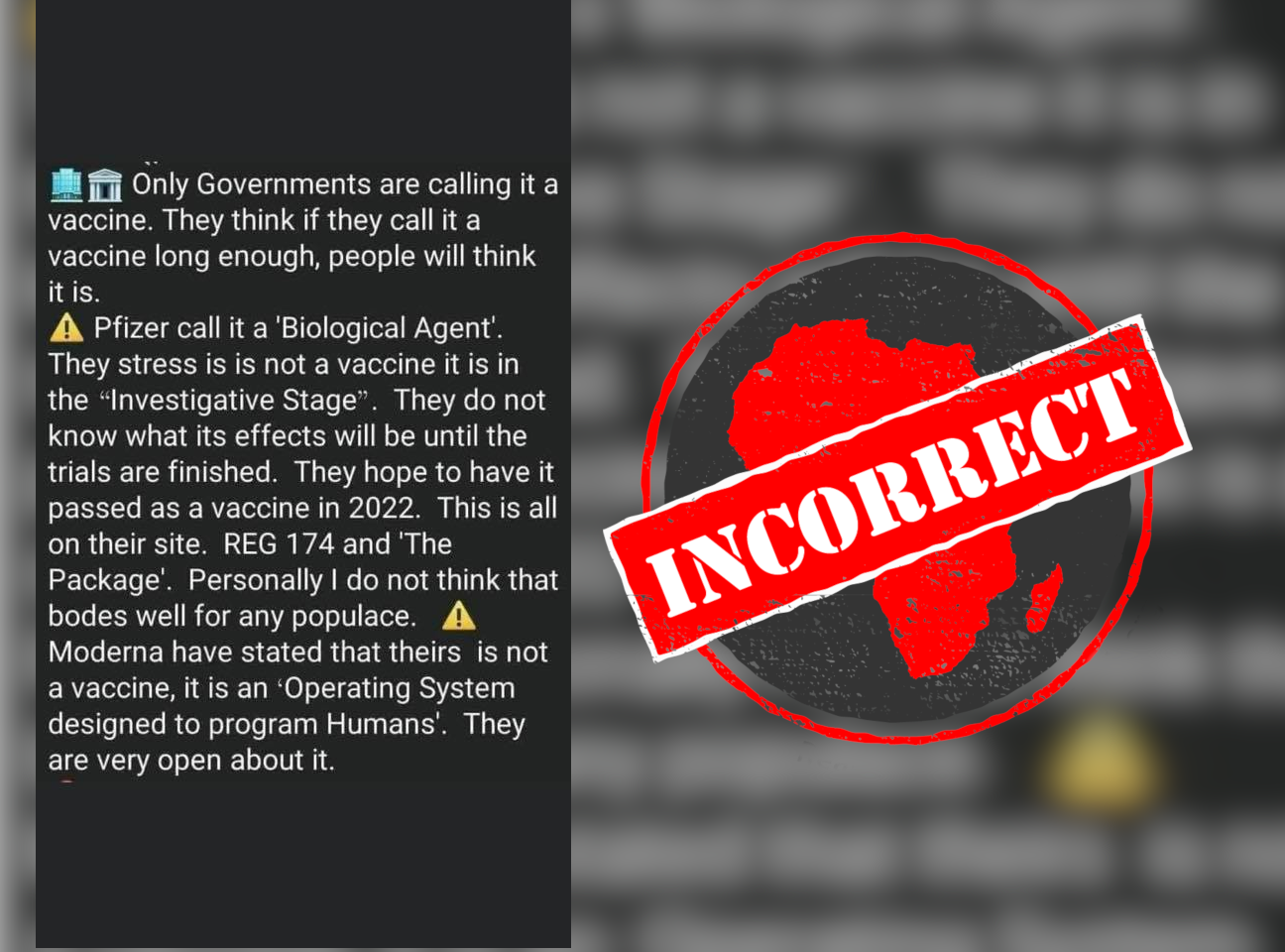“Only governments are calling it a vaccine,” reads a message posted and shared many times on Facebook.
“They think if they call it a vaccine long enough, people will think it is.”
It then claims that Pfizer and Moderna, two pharma companies who have developed Covid-19 vaccines, describe them in more ominous terms.
“Pfizer calls it a 'Biological Agent'. They stress is is [sic] not a vaccine it is in the 'Investigative Stage'.”
It adds: “Moderna has stated that theirs is not a vaccine, it is an 'Operating System designed to program Humans'. They are very open about it.”
The World Health Organization has called for people to report false information about Covid-19 vaccines.
Is there any evidence that the Pfizer and Moderna vaccines are something more sinister?

Moderna only compared mRNA tech to computer code
There is no evidence that Pfizer and Moderna have ever described their vaccines as anything other than vaccines.
Moderna does regularly refer to its Covid-19 vaccine by its technical name – mRNA-1273. But, in the company’s first announcement of the vaccine’s development, Moderna said “mRNA-1273 is an mRNA vaccine”.
This means that the vaccine contains genetic material known as messenger RNA, which carries genetic instructions from DNA. The RNA delivers the instructions to cells in the human body, which use the instructions to build proteins.
As a way to explain how its vaccines work, Moderna compares mRNA to computer code. In the comparison, individual proteins are seen as apps, and RNA as the code that builds those apps. Moderna says its vaccine technology is like a computer operating system, able to change the mRNA in each vaccine it develops against a specific disease.
But this is only a comparison – it’s not reality. Moderna has never claimed that its vaccines are “designed to program humans”. And it always refers to its vaccines as vaccines.
Moderna’s only other description of mRNA-1273 is as a “vaccine candidate” – a vaccine yet to be approved for use. It no longer uses the term. The vaccine has since been approved for use in several territories.
Similarly, when Pfizer announced that it would be working on a vaccine with BioNTech, it referred to the vaccine candidate by the name “BNT162”, and called it a “potential Covid-19 mRNA vaccine”. The company has not referred to the product as a “biological agent” and describes it as a vaccine.
mRNA vaccines misunderstood
Lack of knowledge about how mRNA vaccines work may have led to the many claims that the vaccines change our genetic material, or cause genetic damage.
These claims have been repeatedly disproven – by Africa Check and other fact-checking organisations.
Detailed explanations of how mRNA vaccines – including those developed by Pfizer-BioNTech and Moderna – work have been published by authoritative organisations. Moderna and Pfizer have published their own explanations of the mechanisms behind mRNA vaccines.
Republish our content for free
For publishers: what to do if your post is rated false
A fact-checker has rated your Facebook or Instagram post as “false”, “altered”, “partly false” or “missing context”. This could have serious consequences. What do you do?
Click on our guide for the steps you should follow.
Publishers guideAfrica Check teams up with Facebook
Africa Check is a partner in Meta's third-party fact-checking programme to help stop the spread of false information on social media.
The content we rate as “false” will be downgraded on Facebook and Instagram. This means fewer people will see it.
You can also help identify false information on Facebook. This guide explains how.





Add new comment